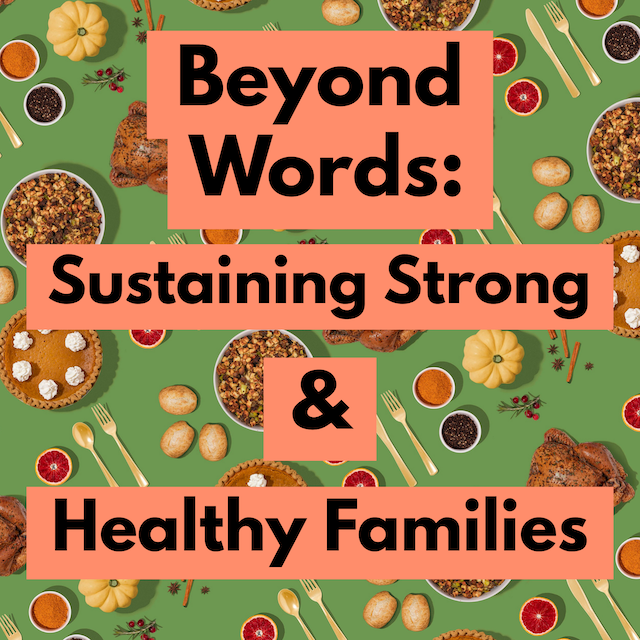Beyond Words: Sustaining Strong and Healthy Families
Generosity and good heartedness are core values in the family system I was adopted into. Throughout the year and especially during the holiday season, you’ll hear members of my family saying, "There is always room at our holiday table." It's a sentiment that suggests inclusivity and kindness and it feels good to open hearts and home to folks that may need a seat at your family table.
With this spirit and some amazing cooks in the mix, family and friends, old and new, gather around our dining table throughout the year. Laughter, love, and abundance fill the space and it is hard not to feel blessed to have been enveloped into this warmth. At the same time, there were members of my family of origin that hung at the edges. As extended family and friends gathered around our table, I could not help but wonder where my extended family of origin were? What were their holiday cultural traditions? And what was it like to look around a table and see people who looked like me?
Adoption is often characterized as a beautiful and transformative journey that brings families together. It is often accompanied by the sentiment, "There is always room at our table," reflecting the openness and love adoptive parents have for the children entrusted to them through adoption. However, when these words are spoken and family of origin are not included in that spirit, it raises important questions about the true meaning of inclusivity within the adoption experience.
The Importance of Family of Origin Inclusion:
Family of origin is an intrinsic part of identity and heritage for all human beings. Not inviting family of origin to the table sends a message that their role and connection are not valued or acknowledged. It is essential to recognize that an adopted person’s narrative is not complete without healthy connections to the family that came before adoption. Including family of origin allows a child access to their full history and can help to mitigate feelings of loss, confusion, and a sense of divided loyalty.
Adoption requires parents to center on true inclusivity and shift from merely extending words of welcome to actively fostering connections with family of origin. Here's how adoptive parents can challenge the status quo and create a more inclusive environment:
See Family of Origin as Your Family too:
I often hear adoptive parents speaking about an adopted person’s family of origins as “their family” when it’s really “our family”. Even with the complexities of family separation, abuse and neglect, there are ways to be in relationship with even the idea of family of origin with open, truthful, and age-appropriate conversation. To fully embrace family of origin, parents must first internalize their feelings connected to the kin of the child. This is big human relationship-building work and with support as needed, community to validate the difficulties, and with the best interests of children at the center, these important connections are possible.
Build Bridges, Not Barriers:
View the family of origin as potential partners and positive influences in the child's life. If personal relationships are not possible because of previous abuse and neglect, you may have to work hard to make sure there is at the very least a conversational connection to family of origin. By integrating the appropriate level of discussion and action, adoptive parents demonstrate a commitment to inclusivity and recognize the value of the child's entire support network and the importance of healthy identity. Family systems have many members and there are often people that can be identified as possible points of connection for you and your child. Work hard to search out these connections and bring them into your life. At minimum, ensuring the child’s culture of origin is a regular part of the whole adoptive family’s life is one way to support a child’s healthy identity development.
Celebrate Shared Moments:
For more practiced families, incorporation of the family of origin into significant events and milestones in the child's life can be transformational. Birthdays, graduations, and holidays can be celebrated together, creating an inclusive environment where a child does not feel they have to choose which family they want to celebrate with. If there is not an opening for connections to family of origin, you can engage in active dialogue about the family that is not always physically present to acknowledge and honor the child's roots, traditions, and cultural heritage.
Create Opportunities for Conversation:
Take the lead in fostering a supportive environment where children feel comfortable discussing and exploring their feelings about family connections. Encourage open conversations about adoption and provide resources that help them understand and navigate your unique family dynamics. By acknowledging and validating emotions, parents can help children develop a healthy sense of self and to fully integrate their birth identity with that of their family of experience through adoption.
This November and beyond, take time to think about the words , "there is always room at our table,". Ask yourself if you are truly open to any and all pulling up a chair. I sought out my family of origin and am in connection with many family members on my maternal side but both of my families have yet to all sit down at the holiday table together. My hope is that your children get connected to origins in whatever way possible with you by their side with open hearts and minds.
Inclusion requires active efforts to build bridges, promote open communication, and celebrate shared moments. By recognizing the importance of family of origin, adoptive parents can create a more culturally appropriate and nurturing environment for children. Only by embracing the full spectrum of a child's identity and heritage can we truly honor the spirit of adoption and create a more inclusive, loving, and supportive family dynamic.





